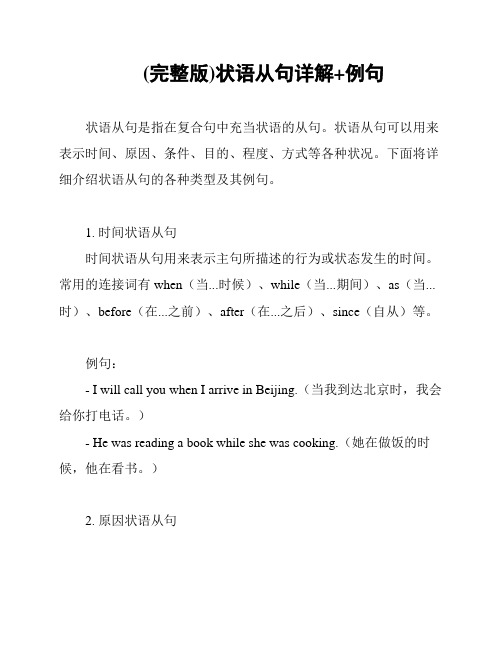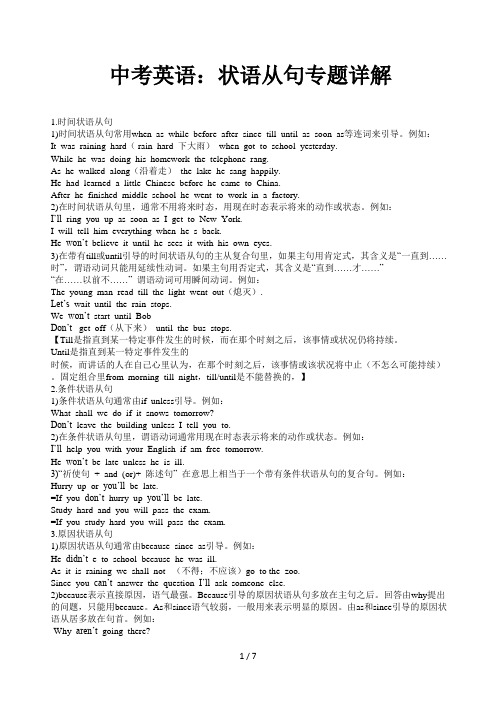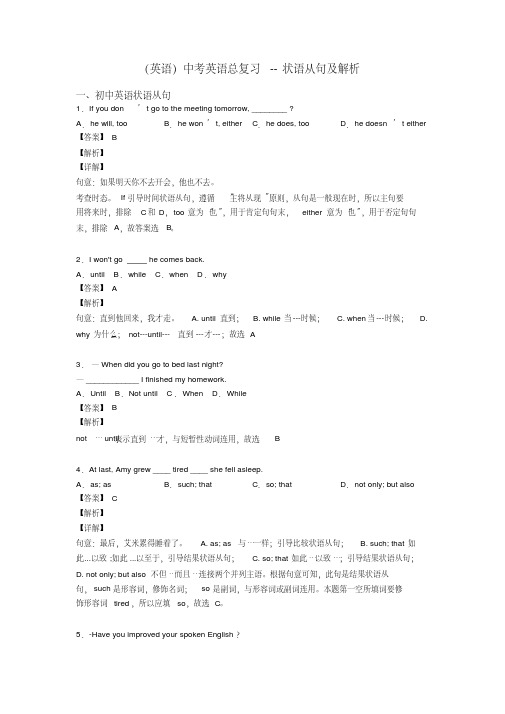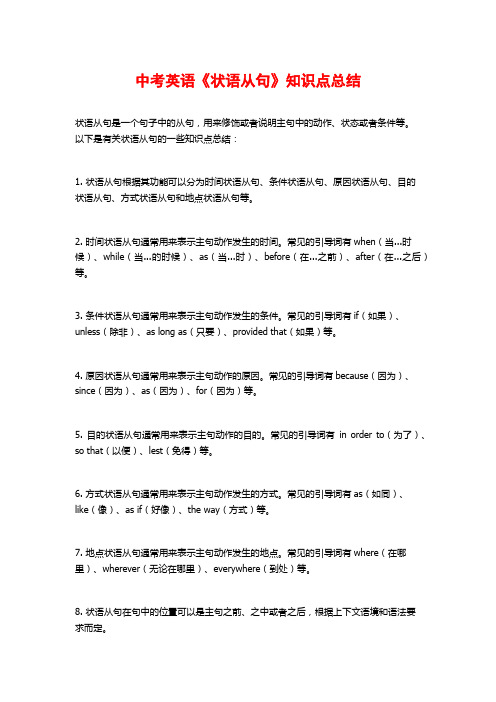[全]中考英语经典句型 状语从句详解
(完整版)状语从句详解+例句

(完整版)状语从句详解+例句状语从句是指在复合句中充当状语的从句。
状语从句可以用来表示时间、原因、条件、目的、程度、方式等各种状况。
下面将详细介绍状语从句的各种类型及其例句。
1. 时间状语从句时间状语从句用来表示主句所描述的行为或状态发生的时间。
常用的连接词有when(当...时候)、while(当...期间)、as(当...时)、before(在...之前)、after(在...之后)、since(自从)等。
例句:- I will call you when I arrive in Beijing.(当我到达北京时,我会给你打电话。
)- He was reading a book while she was cooking.(她在做饭的时候,他在看书。
)2. 原因状语从句原因状语从句用来表示主句所描述的行为或状态的原因。
常用的连接词有because(因为)、since(因为)、as(由于)、for (因为)等。
例句:- I can't go to the party because I have to work.(我不能去参加派对,因为我得工作。
)- Since it is raining, we should stay at home.(由于下雨了,我们应该待在家里。
)3. 条件状语从句条件状语从句用来表示主句所描述的行为或状态的前提条件。
常用的连接词有if(如果)、unless(除非)、whether(无论)、provided(倘若)等。
例句:- If it rains tomorrow, we will stay indoors.(如果明天下雨,我们会呆在室内。
)- We can go shopping unless it is too late.(除非太晚,否则我们可以去购物。
)4. 目的状语从句目的状语从句用来表示主句所描述的行为或状态的目的。
常用的连接词有so that(以便)、in order that(为了)、lest(免得)等。
中考英语:状语从句专题详解

中考英语:状语从句专题详解1.时间状语从句1)时间状语从句常用when as while before after since till until as soon as等连词来引导。
例如:It was raining hard( rain hard 下大雨)when got to school yesterday.While he was doing his homework the telephone rang.As he walked along(沿着走)the lake he sang happily.He had learned a little Chinese before he came to China.After he finished middle school he went to work in a factory.2)在时间状语从句里,通常不用将来时态,用现在时态表示将来的动作或状态。
例如:I’ll ring you up as soon as I get to New York.I will tell him everything when he s back.He won’t believe it until he sees it with his own eyes.3)在带有till或until引导的时间状语从句的主从复合句里,如果主句用肯定式,其含义是“一直到……时”,谓语动词只能用延续性动词。
如果主句用否定式,其含义是“直到……才……”“在……以前不……”谓语动词可用瞬间动词。
例如:The young man read till the light went out(熄灭).Let’s wait until the rain stops.We won’t start until BobDon’t get off(从下来)until the bus stops.【Till是指直到某一特定事件发生的时候,而在那个时刻之后,该事情或状况仍将持续。
(英语)中考英语总复习--状语从句及解析

4.At last, Amy grew ____ tired ____ she fell asleep.
A. as; as 【答案】 C
B. such; that
C. so; that
D. not only; but also
【解析】 【详解】 句意:最后,艾米累得睡着了。 A. as; as 与 …一样;引导比较状语从句; B. such; that 如 此...以致 ;如此 ...以至于,引导结果状语从句; C. so; that 如此 …以致 …;引导结果状语从句;
A. so
B. because
C. before
D. if
【答案】 B
【解析】
试题分析:句意:陈炜今天不在学校因为他在上海参加机器人竞赛。
so 所以; because 因
为; before 在 ……之前; if 如果。所以选 B。
考点:考查连词。
16. Li Na is A. too; to 【答案】 D
18. Our eyesight will become poorer and poorer
A. though
B. unless
【答案】 C
we keep playing with phones. C. if
【解析】
【详解】
句意:如果我们继续玩手机,我们的视力会越来越差。
A. though 尽管,虽然; B. unless 除非; C. if 如果。这里是 if 引导的条件状语从句,遵循主
候”; when 引导的从句,谓语动词既可以是延续性动词,也可以是非延续性动词;
while 引
导的从句,谓语动词必须是延续性动词,而不能是非延续性动词;
as 表示 “在 ……期间 ”“随
中考英语语法学习之状语从句讲义

中考英语语法学习之状语从句一、什么是状语从句?状语从句是指一个句子中,作为状语的从句。
状语从句通常由引导词引导,如连词if、whether、how、when、why 等。
状语从句的作用是修饰主句,起到说明、限制或补充等作用。
二、状语从句的分类1.时间状语从句时间状语从句是指用来说明事件发生的时间的从句。
它通常由连词when、while、since、before、after等引导词引导,用来修饰主句中的时间。
例如:I have been to China twice. (我第一次去中国是在两年前。
)He has been studying English for five years. (他已经学习英语五年了。
)They will arrive at the airport at 7 pm. (他们将在晚上7点到达机场。
)We had a meeting at 2 pm this afternoon. (今天下午我们开了一个会议。
)需要注意的是,时间状语从句通常放在主句之前或之后,但在某些情况下可能会放在主句中间。
2.地点状语从句地点状语从句是指用来说明事件发生的地点的从句。
它通常由连词where、why、how等引导词引导,用来修饰主句中的地点。
例如:I saw her in the library. (我在图书馆看到她。
)They are going to have a meeting in the conference room. (他们将在会议室里开会。
)He is studying in his bedroom. (他正在卧室里学习。
)We had dinner at a restaurant last night. (昨晚我们在一家餐厅吃了晚饭。
)需要注意的是,地点状语从句通常放在主句之前或之后,但在某些情况下可能会放在主句中间。
3.原因状语从句原因状语从句是指用来说明事件发生的原因的从句。
(完整版)中考英语状语从句考点归纳与例析

中考英语状语从句考点归纳与例析【重点讲解】中考英语试题对状语从句的考查主要涉及引导状语从句的从属连词的用法。
单项选择题的四个选项往往是四个连词,这是状语从句最常见的考查形式。
另一个考点是状语从句中的时态,因此,在学习状语从句时要弄清状语从句的几个主要类别,如时间、地点、原因、条件、让步、方式、目的、结果等,同时记住它们的“引导词”及其相关意义。
考点一:引导状语从句的连词的选择。
1、引导时间状语从句的连词主要有when, while, as, by the time, before, after, since, till/until, as soon as等。
其中when,while和as都可表示"当……时候",但用法有区别:when意为"在……时;当……时",可表示"点时间"或"段时间",从句谓语可以是终止性动词,也可以是延续性动词。
例如:When I got home, he was having supper.as意为"边……边……"或"与……同时",重在表示两个动作同时发生。
伴随进行。
as从句是终止性动词时,主句通常也必须是终止性动词。
例如: They sang as they danced.while只可表示"段时间",从句谓语只限于延续性动词。
例如:While I was sleeping, my father came in.注意:从句谓语是持续性动词时,when,while和as可以互换。
主、从句谓语都是终止性动词时,when与as可互换。
从句谓语表示状态时,通常用while。
2、引导地点状语从句的常用连词是where。
例如:Where there is a will there ia a way.3、引导原因状语从句的连接词主要有because, as, since, for。
中考英语语法:状语从句详解

中考英语语法:状语从句详解状语从句是句子的状语由一个从句充当,来修饰主句中的动词,形容词或副词等。
状语从句都由从属连词引导,与主句连接,放在句末时,一般不在前面加逗号。
状语从句根据它表示的意思可分为时间、原因、条件、目的、结果、让步、比较等。
下面我们拣重点的一个一个来分析。
时间状语从句:是由when, as, while, after, before, since, until, as soon as 等从属连词引导的状语从句。
时间状语从句中的谓语动词不能用一般将来时,只能用一般现在时表示将来发生的动作或存在的状态。
如:I will call you as soon as I arrive there.原因状语从句:because, since, as和for都表示原因。
常常令我们不知该用哪个好。
我们来比较一下。
because语势最强,回答why提出的问题,用来说明人所不知的原因。
当能够很明显的看出原因或人们已知原因,就用as或since。
如:I don't like that coat,because the color looks terrible. 由because引导的从句如果放在句末,且前面有逗号,则可以用for来代替。
但如果不是说明直接原因,而是多种情况加以推断,就只能用for。
如:He is not here, because / for his mother is ill.条件状语从句:由if引导的条件状语从句。
if 意为“如果”,引导条件状语从句时,表示假如有从句的动作发生就(不)会有主句的动作发生。
如:If it doesn't rain tomorrow, we will go there by bike. 如果明天不下雨,我们就骑自行车去那里。
If I get there early, I can see the doctor quickly. 如果我早早地到那里,我就可以快点看病。
中考状语从句考点

中考状语从句考点状语从句是中考必考的语法项目之一,它引导的状语从句在句中充当状语,修饰主句的谓语动词、形容词、副词或整个句子。
状语从句可分为以下九类:时间状语从句、地点状语从句、原因状语从句、目的状语从句、结果状语从句、条件状语从句、方式状语从句、让步状语从句和比较状语从句。
一、考点解读1. 掌握引导词的用法。
引导词有:when(当……时候)、while(当……时候)、as(当……时候)、before(在……以前)、after(在……以后)、since(自从)、because(因为)、so that(以便)、as if(好像)、whether(是否)、though (虽然)、as long as(只要)等。
2. 掌握状语从句的时态。
主句是现在时态时,从句可为需要的任何时态;主句是过去时态时,从句要用过去的某种时态形式。
但客观真理除外。
3. 从句是祈使句或省略句时,需用陈述语序。
4. 从句的位置:时间、地点、原因状语从句通常放在主句之后;但当主句是祈使句时,从句通常放在主句之前;而当主句是一个完整的句子时,有时也可用从句作插入语。
5. 从句与主句之间不可存在逗号,需用连词连接。
6. 从句是therefore时,只放在主句之后,不能倒装。
7. 从句与主句的逻辑关系要清楚。
8. 从句中的关系代词that、which、who在任何情况下都不可以省略。
9. 连接词if、unless在引导条件状语从句时不能用and并列连接词。
在否定词not用在句首时表部分否定;但需用and并列连接词时表完全否定。
二、常考考点梳理1. 时间状语从句的考点:①表示“一……就……”的英语表达为“as soon as”,其用法为:“as soon as+主+谓+其他,主+can/may+动词原形+其他”。
例如:As soon as he finishes his homework,he will go to the library. 他一完成作业就要去图书馆。
中考英语《状语从句》知识点总结

中考英语《状语从句》知识点总结状语从句是一个句子中的从句,用来修饰或者说明主句中的动作、状态或者条件等。
以下是有关状语从句的一些知识点总结:1. 状语从句根据其功能可以分为时间状语从句、条件状语从句、原因状语从句、目的状语从句、方式状语从句和地点状语从句等。
2. 时间状语从句通常用来表示主句动作发生的时间。
常见的引导词有when(当...时候)、while(当...的时候)、as(当...时)、before(在...之前)、after(在...之后)等。
3. 条件状语从句通常用来表示主句动作发生的条件。
常见的引导词有if(如果)、unless(除非)、as long as(只要)、provided that(如果)等。
4. 原因状语从句通常用来表示主句动作的原因。
常见的引导词有because(因为)、since(因为)、as(因为)、for(因为)等。
5. 目的状语从句通常用来表示主句动作的目的。
常见的引导词有in order to(为了)、so that(以便)、lest(免得)等。
6. 方式状语从句通常用来表示主句动作发生的方式。
常见的引导词有as(如同)、like(像)、as if(好像)、the way(方式)等。
7. 地点状语从句通常用来表示主句动作发生的地点。
常见的引导词有where(在哪里)、wherever(无论在哪里)、everywhere(到处)等。
8. 状语从句在句中的位置可以是主句之前、之中或者之后,根据上下文语境和语法要求而定。
9. 引导状语从句的引导词(连词)一般只有一个,不同的引导词具有不同的语法功能和用法规则。
10. 状语从句与主句之间存在着时态、语序和语气的一致性。
如主将从现、主过从过、主现从现等。
以上是对中考英语《状语从句》知识点的简要总结,希望对你有所帮助!。
- 1、下载文档前请自行甄别文档内容的完整性,平台不提供额外的编辑、内容补充、找答案等附加服务。
- 2、"仅部分预览"的文档,不可在线预览部分如存在完整性等问题,可反馈申请退款(可完整预览的文档不适用该条件!)。
- 3、如文档侵犯您的权益,请联系客服反馈,我们会尽快为您处理(人工客服工作时间:9:00-18:30)。
中考英语经典句型丨状语从句详解1. 时间状语从句When当……时候, 通常指某一特定的时间点,主句与从句的动作同时发生。
I was doing my homework when dad left home. 爸爸离开家时,我正在做作业。
When Iooked out the window, I saw a plane flying.当我向窗外望去时,我看到一架飞机在飞行。
Someone knocked at then I was having breakfast.当我正在吃早饭时,有人敲门。
When the children had gone to bed, she began to prepare her lessons.当孩子们上床睡觉后,她开始准备功课。
While 在……期间,往往指一段时间。
意为“在……过程中,在……期间”,主要用三小表示主句和从句两个持续时间较长的动作同时发生或同时进行。
John was doing his homework in the study while we were eating. 我们吃饭时,约翰正在书房里做作业。
While we were in Australia, we saw her twice.我们在澳大利亚时,见过她两次。
Could you help us take care of the children while we are not at home?我们不在家时,你能帮我们照看一下孩子吗?We are cleaning the classroom while they are playing the football.他们在踢足球的时候,我们正在打扫教室。
As 一边……一边, 随着Mary sang songs as she was dancing. 玛丽一边跳舞一边唱歌。
As he grew older, he became more and more respectful to his mother. 随着年龄的增长,他越来越尊重他的母亲。
She was doing her homework as she was listening to the music.她一边听音乐,一边做作业。
As I was going out, it began to rain.我正要出去时,天开始下雨了。
The moment 一……就……=as soon as , immediately,---Did you remember to give Mary the money you owed her?你记得把你欠玛丽的钱给她了吗?---Yes, I gave her the moment I saw her.是的,我一见到她就给了她。
Not…until 直到……才We didn't start eating until mom came back from work.直到妈妈下班回来,我们才开始吃饭。
He didn’t leave the office until he finished the work.他直到完成工作才离开办公室。
Before 在……之前We must get to the station before nine o'clock.我们必须在九点钟以前到达车站。
The passengers should arrive at the airport an hour before the flight departs.旅客必须在飞机起飞前一小时到达机场。
After 在……之后The customer left the ticket counter after he had a quarrel with the ticket agent.那位顾客和售票员吵了一架后离开了售票处。
Since自从……, 通常主句用现在完成时I have never been there again since I graduated from the university.自从我大学毕业后,我就再也没有去过那里。
lt is three years since he joined the army. 他参军已有三年了。
It is just a week since we arrived here.我们到这里才一星期。
As soon as 一……就……I called my mother as soon as I got to Shanghai. 我一到上海就给妈妈打了电话。
As soon as I got good grades, I told my mother the good news. 我一取得好成绩,就把这个好消息告诉了妈妈。
Jack went to school as soon as he got well.杰克一痊愈就去上学了。
No sooner than 一……就……no sooner…than…用于句首要求倒装Hardly …when…Scarcely …when…No sooner had he arrived than he went away again.他一到就又走了。
Once 一旦……就……Once you see him, you will never forget him.一旦你见到他,你将永远不会忘记他。
Every time, each time 每次whenever 每当Each time he came to town, he would visit our school.他每次进城都要参观我们学校。
2. 条件状语从句引导状语从句的连接词有:If如果, unless除非, as long as只要, as (so) far as 据……所知,in case万一, provided that假如, on condition that 若是,以…为条件①If 如果If you don’t hurry up, you will miss the plane.如果你不快点,你就会误了飞机。
②Unless 如果不, 除非=if notWe can’t get there on time unless we book the earliest flight.除非我们订最早的班机,否则我们无法准时到达那里You can't get good grades unless you study hard. 除非你努力学习,否则你无法取得好成绩。
③as long as 只要We will succeed as long as we keep on trying.只要我们继续努力,就一定会成功。
④as (so) far as 据……所知As far as I know, he speaks English very well.据我所知,他英语讲得很好。
⑤In case 假使, 如果The plane cannot take off in case it rains.万一下雨,飞机就不能起飞了。
⑥provided that 如果,有时省略thatThe plane will be in good condition provided that it is taken care of carefully.如果悉心照料,这架飞机将会保持良好状态。
⑦On condition that 条件是…He said that he would come to the meeting on condition that no one asked him to speak.他说他会来参加会议,条件是没有人请他发言。
注:主从句的动作发生在将来时,则主句用将来时, 从句用一般现在时(主将从现)。
If l arrives in Beijing tomorrow, I will call my mother.如果我明天到达北京,我会打电话给我妈妈。
3. 地点状语从句地点状语从句只有两个连词: Where, wherever①Where 在……地方,在哪里Where there is a will, there is a way.有志者,事竟成。
②Wherever 无论哪里Wherever you go,I will never forget you.无论你到哪里,我都不会忘记你。
4. 原因状语从句because, as, since, now that, 和considering that, seeing that 这六个连词都用于表示表示原因, 但在语气上一个比一个弱.①Because 因为,通常从句放在主句后.Jack is very unhappy today because he failed in the exam.杰克今天很不高兴,因为他考试没及格。
School didn't have a sports meeting today because it was raining.今天学校没有运动会,因为下雨了。
②As 因为, 通常放在句首As LiLei is honest and modest, everyone likes him.由于李雷诚实谦虚,大家都喜欢他。
As they studied hard, they got good grades.由于他们努力学习,他们取得了好成绩③Since 既然因语气较弱, 常译为既然(众所周知的原因)Since you know about it, I won't tell you.既然你知道,我就不告诉你了。
Since everybody has come, let's start the class.既然大家都来了,我们开始上课吧。
④now that 既然Now that the weather is fine today, we can travel.既然今天天气很好,我们可以旅行了。
Now that you like reading, I'll buy you some books!既然你喜欢读书,我就给你买几本书!Now that you are here, you can dance with us.既然你来了,就可以和我们一起跳舞吧。
⑤considering that 顾及到,考虑到Considering that he is new here,everyone is very friendly to him.考虑到他是新来的,大家对他都很友好。
Considering that she is still young, we let him do some simple things.考虑到她还年轻,我们让他做一些简单的事情。
